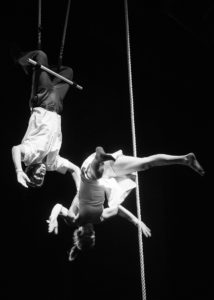Congratulations! You Graduated from Circus School…Now What?
Congratulations graduate! You graduated from circus school and are ready to embark on a career in circus. Perhaps you will form a small company with fellow graduates like many of your predecessors. Or maybe you’d like to take on a contract at an existing show for a season, or to try your luck with creating a show with a couple of friends and launching it at a fringe festival. These are some well-known ways to ease yourself into the professional circus mix, but as you know, the mix has been shaken up lately with a global pandemic, and the usual systems to find employment in the circus world have been disrupted.
Navigating those frameworks was tricky as the rules were slowly revealed to you, the circus student, through your circus educators, your circus school, and through the straight talk of your peers. Now add a pandemic to this elaborate system, in a year when graduation shows won’t be happening (in the spring at least), and the process has just become more mired in complexity. Will an agent recognize your skills and artistry over a video? Will the festival you dreamed of doing your breakout show in 2021 even happen? Will countries provide the proper visas? Will travel to certain areas be restricted? How will you create a show with if you can’t be in the same room with cast members or must be 6 feet apart? Will residency, training spaces, and venues open soon?
No previous circus graduate will have an answer to these questions brought up by the uncertainty of the times. It is your graduating class that will be setting the barre for future circus graduates on how to adapt to unprecedented restrictive circumstances and how to succeed. Fortunately, circus itself is built on the idea of working within narrow restrictions and systematically widening them with research, trial, and error. Think about the many hours you spent in circus school honing your discipline and accomplishing what all bystanders agree is an impossible task. Now is the time where you will be tested on how to transfer those qualities to a new area of circus, how to find a job, or create it out of thin air, in a time when the world will be distracted with adapting in its own right.
Despite the wildly new circumstances, some topics remain very important for the circus graduate: Getting a contract right out of school, how to network and get guidance and support from professionals. We spoke with industry professionals on how they navigated the transition from school to work and what their modifications would be for 2020 graduates about to enter the circus workforce in a time of deep uncertainty.
Transitioning

The transition from school to work can be a seamless one or a bumpy one, but the circus school itself and the connections you make from there can be part of a smoother process. Here is an example from Liv Knoche & Tobias Willasch, an award-winning trapeze duo from Germany, “A lot of things that did not seem important in school did prepare us for after school. Working with circus artists from outside school in projects like group shows and outside eyes for the acts was extremely helpful, they gave us perspective. And they encouraged us that life after circus school would be great! A good thing to hear while in school!”
Harm van der Laan, a 2012 graduate of Codarts (and co-founder of Tall Tales Company in the Netherlands, along with Maartje Bonarius) explains how the Dutch circus world didn’t have a well-developed professional circus sector at the time of their graduation. “All programmers we contacted wanted to see the show before they booked it, so we started at square one, performing for little money at small festivals, inviting all the professionals we could. I wasn’t worried about surviving as I was happy to teach or do less glamorous circus jobs to be able to pay the bills–at the same time, we didn’t quite know where to start to actually get jobs. The school really wasn’t any help in that regard.”
But circus schools like Codarts have evolved their programs to serve students better after graduation. Beyond the graduation show and ‘Epreuve’ solo show, depending on your school, in recent years there may be a post-graduation show tour or alumni workshops. Rosa Boon, director of TENT Circustheater Producties also teaches cultural entrepreneurship at Codarts, says they provide start-up classes about entrepreneurship for the 1st and 2nd-year students and that even after graduation Codarts “provides incidental training for alumni…and the possibility to get advice during and after school.” Take the opportunity to further your education in circus business whenever offers arise, she stresses. Boon says that educators are also unofficial fonts of knowledge about opportunities, often tipping their students off to auditions or residency opportunities, or helping from a distance after graduation by answering questions on entrepreneurship
Be Proactive & Diverse

Eric Bates is an ENC graduate, a cigar box juggler extraordinaire, and part of Barcode Circus Company,the Russian bar troupe who won both the silver and the audience prize at the 39th Cirque de Demain. He has a mindset for success that began well before the pandemic but that has been put to the test. Bates points out how a lot of the responsibility to make things happen, or not, falls to you, the graduate, “You get out what you put in school– you can talk to lots of different people and learn a lot, or not. You can train hard and in your free time, or not. You can learn to edit videos at night, or not. You can get extremely good at only your act and work like a boss with just that act, or develop lots of skills. It depends on what you like to do.”
But if inexperience makes you doubt where to start, Bates has advice for that too. “Stay proactive and follow the fun. Use this time to hammer away at what interests you– improving your website, making a new act if possible…You better believe that companies are going to be looking for the proactive people, the ones taking this crisis as a creative challenge and asking what they can do in a new and different way, not the ones sitting around waiting for someone to hire them.”
Stay proactive and follow the fun
Though you may be tempted to Netflix and chill the summer away as a reward for having worked so hard–or as a defensive response to the uncertainty, there is much to be done still, and giving yourself some challenges that fit with your interests is a good way to start.
Explore New Mediums
Bates has a few examples for you about ways to explore, as he is not one to rest on his laurels. Besides a healthy regime of Zoom panels and meetings, he’s been working on his video blog and writing 1000 words a day for a novel as well. The one thing he hasn’t done yet is online performances, stating, “I don’t know how I could do it in a new and creative way that exploits the medium. I don’t think live performance filmed in a living room is that interesting to me (but check out what Nathan Biggs Penton did for one on his youtube channel–that’s sweet), but if that does light your creative fire, those opportunities are absolutely out there.”
I think that in these extraordinary times it is completely ok to not be productive
On the flip side of the productivity surge, van der Laan adds a sense of calm and reflection to the mix, “Let me start out by saying that I think that in these extraordinary times it is completely ok to not be productive. Or rather, that spending time with family, taking care of your own physical and mental health, taking a ‘normal’ job on the side, or taking long walks are things that are equally worth pursuing and productive in their own right.”
“Still,” he adds, “Here are some examples of things you can do, that won’t make you money immediately, but should turn out to be good investments in the long run:”
1. Set the framework of your business--Set up bank accounts, find liability insurance that covers circus artists, write risk assessments for your show, update your website... this is the perfect time to take care of all the things you don't want to have to worry about when you are in the middle of creating a new act whilst touring another. 2. Write a business or policy plan--A document that outlines your mission, vision and concrete goals for the future (for the coming year or four years), as well as a brief marketing plan that outlines your market, your audience/clients and how you want to reach them. Though writing something like this does feel like a chore it is something that helped me more than I ever would have thought it would. Chances are that you will need one in the near future--as proof to a bank or government institution that you are serious enough to apply for funding. Forcing yourself to verbalize your motivations and plans will help you identify the weak spots and find solutions. Personally, it also gave me many insights into why I want to work in specific ways and in what sets me apart from others. 3. Prepare a list of clients--Lists of theaters, festivals, cruise ships, variety theaters, circuses, (local) foundations, residencies are hard to come by and time-consuming to compile.” 4. Announce your presence--No one will book you if they don't know you exist. Whether it is Instagram, a Youtube showreel, or a guerilla marketing campaign, find a way to make sure people know you are out there. Preferably without giving away all of the movement material you've spent years creating. 5. Ask people for advice--Circus professionals are surprisingly approachable and almost everyone likes helping out because we all remember what things were like when we started out ourselves. 6. Acquire additional skills--Take that business course, learn to play an instrument, get crazy good at gardening, volunteer in your area. Often it's the things we learn that initially have nothing to do with circus that will later form an unexpected inspiration. And if not, it is still time well spent.
Be Present & Network

Regarding van der Laan’s tip to reach out to fellow circus artists for advice, Bates seconds that, “Talk to people that now run companies or coach about what circus was like 30 years ago. Be curious. Don’t take it for granted that this is a comfortable career path– it comes with a lot of hustle, but it’s a sweet lifestyle if that’s the sort of thing you like.” But Bates cautions, “Don’t be a jerk. No one wants to tour with people that are hard to be around or unprofessional, and that’s how a lot of companies make their decisions on hiring- it’s just not worth the extra headaches.”
Van der Laan agrees,” In the end, what you do on stage is only 40% of getting the jobs. 60% is if you are nice to work with. Whether you are a party animal that makes friends with everyone around you, or a training beast that is always perfectly prepared, your generosity is the quality that will ultimately get you jobs.”
He extends that advice to circus school life too, “When you are in school, never forget that you are already building your network. Be a pleasure to work with and nice to all, guest teachers, your classmates …because there is a large chance that these are the people who will be getting you jobs after you graduate, often just by putting in a kind word. I’ve seen the inverse happen as well, some people found it hard to get jobs because in school they made a name for themselves of being difficult to work with. Don’t be that person.”
Solo Work Versus Teaming Up
You may be wondering if your chances are better for employment as a solo artist or as part of a collective or company. It depends on the type of work you are trying to get, but there are pluses and minuses to both, according to Bates “As a solo artist you can do whatever you want, so logistically it is considerably easier- no other schedules to work around except your own and maybe your family/ significant other’s. No negotiating amongst your partners about price and conditions that everyone is comfortable with since it’s just you. That said, there is strength in numbers and you have access to a variety of strengths having a team. You also can sell each others’ acts when someone comes looking for one of your acts…We (Barcode) always try to sell all of our acts on a contract because we like doing all of our acts and it pays better, which often works since I believe all of our acts are of high quality and different enough from each other that they are complimentary (boxes, Russian bar, hand to hand, aerial hoop).”
Make sure to grab all the possibilities to keep on meeting people. Make sure to have a 1-minute pitch ready
1st jobs After Graduation–Paying Your Dues
Van der Laan is glad that he took every opportunity while he was at school to perform even if it sometimes clashed with his education, just for the connections and experience he was able to get as a result. He doesn’t just advocate for taking all of the performance opportunities that come up, but also for creating them out of thin air with some hustle, and this includes corporate gigs and street shows. “I was already performing before circus school and continued to do so during my time at Codarts. At that time, it was mostly corporate events and teaching jobs. During school, me and Maartje created a street show that we started performing the summer we graduated. If I remember well, we had about six jobs for the entire summer.”
When it comes to the pandemic, the delays in performances starting back up, the closed practice spaces, the canceled festivals, it could be easy to question your choice of profession, until you remember that a large portion of the world is out of work right now during the quarantine and that your career choice basically allows you to be not just an artist but an entrepreneur who creates their own work as opportunities slowly unfold again. It might be a bumpy start, but Boon has a message of hope to go with her advice, “Connect— in the sense of being present during online events and possibilities. Make sure to grab all the possibilities to keep on meeting people. Make sure to have a 1-minute pitch ready– about who you are, what you do, and your dreams and wishes for the future. In the end, programmers, companies, and bookers also want to get in contact with this new generation. While the professional field does not see the graduations (this year) it does not mean that they are not interested in the new generation of graduates.” In other words– go get it class of 2020, show us how it’s done!
For a list of circus graduates of 2020, visit CircusTalk's Circus Graduates of 2020--An Online Showcase Page
Feature photo of &/courtesy of Liv Knoche & Tobias Willasch...
Do you have a story to share? Submit your news story, article or press release.



